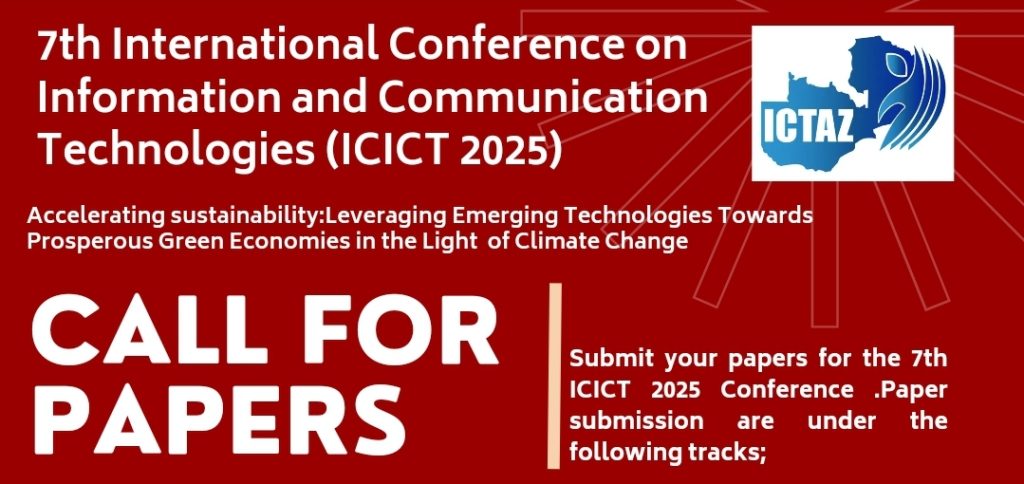
CALL FOR PAPERS
The objective of ICICT is to support and stimulate active productive research which could strengthen the technical foundations of engineers and scientists in the continent, develop strong technical foundations and skills and lead to new small to medium enterprises within the African sub-continent. We also seek to encourage the emergence of functionally skilled technocrats within the continent. We invite research papers, workshop proposals, and panel proposals on the topics listed. The list is not exhaustive. Tutorials and Sessions that will impact on and enhance Postgraduate research within the continent will be considered. Training Workshops on research software tools such as Matlab, Scilab, Althium, Qiskit, Genesys, COMSOL Multiphysics and others are welcome. The Conference also provides a forum for students to compete for best papers and receive an award. Registration fees for student authors are also discounted.
SUBMISSION GUIDELINES
All submissions for the 7th International Conference in Information and Communications Technology must be made through Microsoft’s Conference Management Toolkit (CMT). Papers submitted through any other means will not be considered. Please follow the submission guidelines below;
1. CREATE AN ACCOUNT: If you do not already have a CMT account, visit Microsoft CMT and create one.
- Use a valid email address to register.
2. SELECT CONFERENCE: Once logged in, search for “7th International Conference in Information and Communication Technologies” in the list of available Conferences
- Click on the conference link to access the submission portal.
3. SUBMIT YOUR PAPER: Click on “Create new submission” in CMT system and enter all the required details.
- Follow the specified requirements about paper submissions and submit.
- After submission you will receive a confirmation email. You may edit your submission before the deadline.
Submit your paper HERE.
Demonstrators and Products Tracks
ICICT has made provision in 2015 for display and demonstration of working software and hardware that are relevant to African manufacturing base. We will consider working prototypes from university students, staff and industry.
Paper Submissions
Original research papers containing new research findings which have not been submitted concurrently to any other publication outlets such conferences, Journals and books are sought from authors. Full length papers must be limited for six (6) A4 single-line spacing pages (10-point font size minimum) and formatted following the IEEE conference paper format. Student papers are also limited to between three (3) and four (4) A4 single-line spacing pages. ICICT has adopted the IEEE referencing formats for all its publications. Paper submission is via the conference site: [HERE]. Do not email papers directly to Track or Conference Chairpersons as this makes reviewing of your papers messy and difficult. All papers submitted to the conference will be reviewed by at least two international reviewers. Papers which are registered and presented during the conference will be included in the conference proceedings with an ISBN to facilitate access and referencing.
Deadlines:
Deadline for expression of interest in ICICT tutorials: June 27, 2025
Deadline for submission of full length papers: June 27, 2025
Deadline for submission of student abstracts: June 27, 2025
Deadline for submission of tutorials: June 27, 2025
Deadline of notification of authors: July 18, 2025
Deadline of final paper submissions: August 15, 2025
Deadline for Notification of Tutorials: July 18, 2025
Post Conference Publications:
All papers accepted and presented at the conference will be submitted to Compendex and SCOPUS for indexing. When we secure the IEEE technical sponsorship, reviewed papers which meet the IEEE requirements and presented during the conference will be forwarded to the IEEE for consideration for inclusion in the IEEE Xplore. Papers will also be submitted to iqproceedings.org for inclusion in their conferences database for worldwide access and indexing. Despite the above undertaking, authors whose papers are found to be technically relevant and suitable as possible journal publications will be invited to extend their ICICT conference papers to full length journal papers of not less than 12 pages. Such extensions must ensure that the extended paper is clearly significantly different in content from the paper presented during the conference. They will be further reviewed and if the extended papers are accepted by the Journals, they will be included in special 2025 issues of:
- Zambia ICT Journal (https://www.icict.org.zm/submission-2/)
Engineering Technology
- Devices and Mobile Phone Applications and Software
- Wireless Mobile Communications (3G, 4G, 5G and 6G)
- Sensors and Remote Sensing
- IoT, Embedded Systems
- Smart Grid and Energy Harvesting
- Telecommunications
- Applied Mathematics
- Computer Networks
- Scientific Computing (Bioinformatics, GIS etc.)
- Computational Intelligence and Forensics
- Radio Frequency and Microwave Engineering
- Industry 4.0
- Artificial Intelligence (AI), Deep Learning and Regenerative AI
- Business Information Systems and Management
- Data Science
- Microservice Architectures
- Cybersecurity
- Blockchain
- Quantum Computing, Quantum algorithms
- High Performance Computing
- Cloud Computing, Grid Computing and Cluster Computing
- ICT for Development (eLearning and e-Education, e-Health, e-Agriculture, Smart Cities)
- E-Government and Smart Citizens
- Environmental Sustainability
- Food Security (Policies & Technical aspects)
- Governance, Climate Policies and Frameworks
- Community Engagement and Equity
- Sustainable Urban Development
- Water Resource Management
- Ecosystem Conservation and Biodiversity
- Green Finance and Investments
- Education and Awareness
- Innovation and Startups in Green Technology